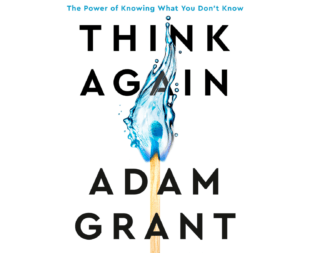A kind CA grandparent recently gave me a copy of Adam Grant’s Think Again. I have always been a fan of Grant’s work and appreciated the gift. Grant is an organizational psychologist, best-selling author, and professor at the Wharton School at the University of Pennsylvania. His work challenges conventional wisdom as he asks us to reconsider what we think we know about the world.
 Human beings develop knowledge over the course of our lives that is founded on assumptions, beliefs, convictions, opinions, and bias. Yet, humans tend to go through life without ever re-examining those ideas. Our education system reinforces this in many ways. We go to school from a young age to early adulthood. During that time, knowledge and intelligence are developed. But, then, unless that adult tries to be a continuous learner, a fixed mindset can emerge. Even as we continue to learn as adults through lived experience, there are ideas and experiences that further shape our world view and drive our decision making and assumptions. If we think about the fast, and almost exponential, growth of knowledge in the fields of science, the humanities, the arts, and the social sciences, it should be obvious that we can soon be out of touch with reality, unless we constantly re-examine our thinking. This isn’t obvious to most people, and that is what makes Grant’s work so illuminating. As he notes, we can become “blind to our blindness” if we are not constantly curious about the world around us. He argues that the more intelligent we are, the less able we are to demonstrate real curiosity and gain wisdom.
Human beings develop knowledge over the course of our lives that is founded on assumptions, beliefs, convictions, opinions, and bias. Yet, humans tend to go through life without ever re-examining those ideas. Our education system reinforces this in many ways. We go to school from a young age to early adulthood. During that time, knowledge and intelligence are developed. But, then, unless that adult tries to be a continuous learner, a fixed mindset can emerge. Even as we continue to learn as adults through lived experience, there are ideas and experiences that further shape our world view and drive our decision making and assumptions. If we think about the fast, and almost exponential, growth of knowledge in the fields of science, the humanities, the arts, and the social sciences, it should be obvious that we can soon be out of touch with reality, unless we constantly re-examine our thinking. This isn’t obvious to most people, and that is what makes Grant’s work so illuminating. As he notes, we can become “blind to our blindness” if we are not constantly curious about the world around us. He argues that the more intelligent we are, the less able we are to demonstrate real curiosity and gain wisdom.
Grant notes that most people view intelligence as the ability to think and learn. However, the ability “to think and unlearn” is a skill that will better help us in a constantly changing world. Grant encourages us to be what he calls, “flexible thinkers.”
He talks about the “comfort of conviction” that can divide and limit growth. Grant describes a remarkable story of Daryl Davis, an African American musician who starts a conversation with a white man at a gig. Davis learns that the man is a member of the KKK. Instead of not engaging or getting into a conflict, Davis asks, “How can you hate me when you don’t know me?” Over time, the two men become friends and the white man renounces his membership in the KKK. Tribal thinking is a powerful force and blinds some to the absurdity of making stereotypical judgments about an entire group of people. We are all capable of elevating our understanding. Think Again has a great chapter called “The Joy of Being Wrong.” In it, Grant notes that being wrong allows us to learn something new and cites Isaac Asimov’s example that great discoveries often begin not with “’Eureka!’ (I found it!) but ‘That’s funny…’”
Grant argues that “knowing what you don’t know is wisdom.” If we can accept this, we have an opportunity to live in a world that is less argumentative, less dogmatic, and less judgmental. Social media creates a space for anyone to self-publish. Too many people broadcast hate, judgments, and lies. I fear for young people who see this on a daily basis. As Grant says, “We listen to ideas that feel good—rather than ideas that make us think harder.”
At Colorado Academy, we try to do many things as we work to educate young people. One of the most important things we do is to teach kids how to think, not what to think. When I am in the classroom, I love the student debates and discussions over ideas. The other day, two students were arguing about a historical issue. That conflict can create a dynamic classroom. And, it can help everyone learn from each other.
I encourage you to get this book for a summer read. It’s definitely one CA has on our recommended summer list—view the full list below. I plan to take up Grant’s challenge to rethink my understanding of the world and ask more questions. I look forward to hearing your thoughts on the book.
Colorado Academy Summer Reading Recommendations
The following list of books was created by CA’s Library Team.
We hope you enjoy a great book or two this summer.
Fiction
- Detransition, Baby by Torrey Peters
- Dial A for Aunties by Jesse Q. Sutanto
- The Final Revival of Opal & Nev by Dawnie Walton
- Klara and the Sun by Kazuo Ishiguro
- Leave the World Behind by Rumaan Alam
- Of Women and Salt by Gabriela Garcia
- The Parted Earth by Anjali Enjeti
- The Prophets by Robert Jones Jr.
- The Rose Code by Kate Quinn
- Tiny Tales: Stories of Romance, Ambition, Kindness, and Happiness by Alexander McCall Smith
Non-Fiction
- Aftershocks: A Memoir by Nadia Owusu
- A Swim in the Pond in the Rain by George Saunders
- Broken (in the best possible way) by Jenny Lawson
- The Code Breaker: Jennifer Doudna, Gene Editing, and the Future of the Human Race by Walter Isaacson
- Four Hundred Souls: A Community History of African America, 1619-2019 by Ibram X. Kendi
- Hunt, Gather, Parent: What Ancient Cultures Can Teach Us About the Art of Raising Happy, Helpful Little Humans by Michaeleen Doucleff
- Last Call: A True Story of Love, Lust, and Murder in Queer New York by Elon Green
- One Life by Megan Rapinoe
- Speak, Okinawa by Elizabeth Miki Brina
- Think Again by Adam Grant
- Why We Swim by Bonnie Tsui
